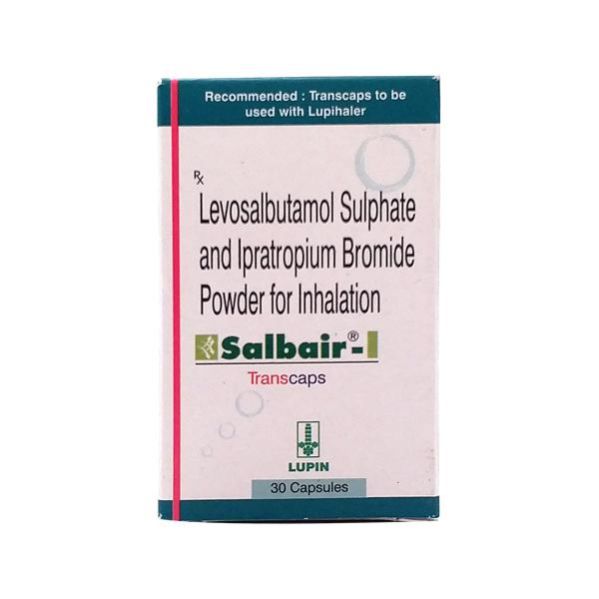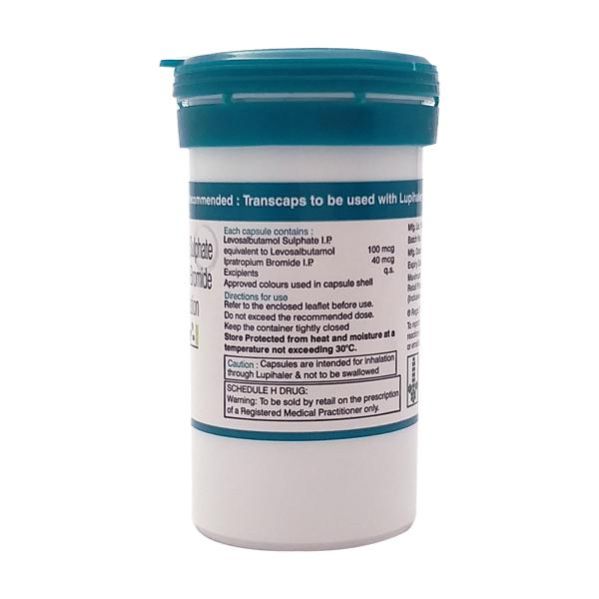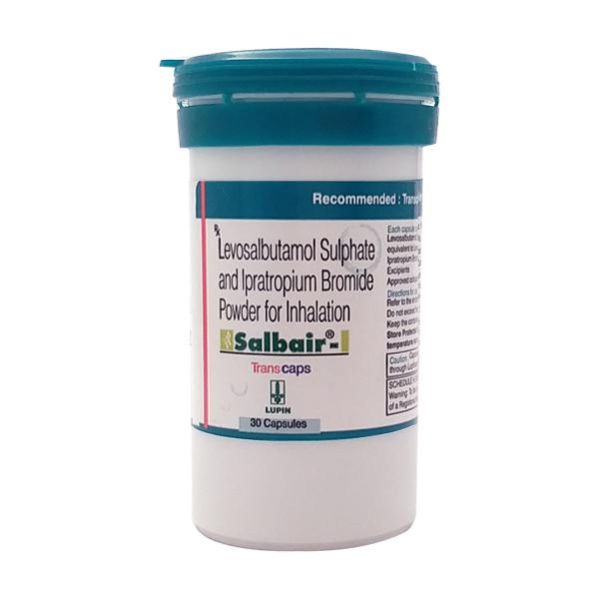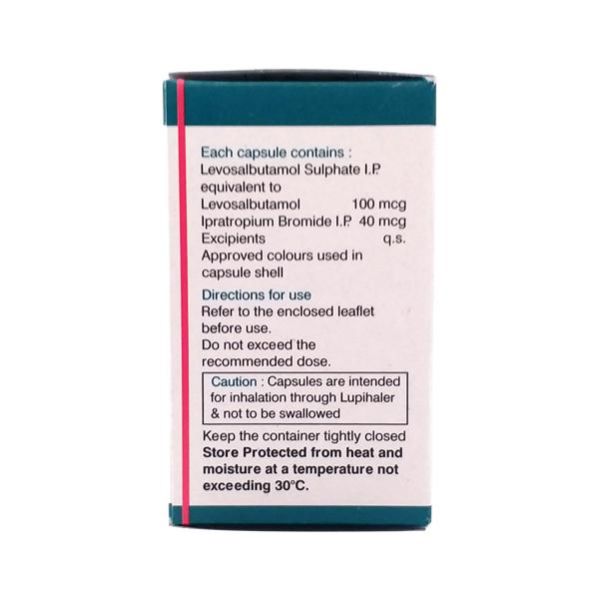Salbair I Transcap 30'S
IPRATROPIUM 40MCG+LEVOSALBUTAMOL 100MCG
₹ 122.00
₹136
(Inclusive of all taxes)
-

No Warranty
-

COD Avilable
-

Non Returnable
-

cancelable
About this item
INTRODUCTION ABOUT SALBAIR I TRANSCAP
SALBAIR I TRANSCAP is a combination of Ipratropium and Levosalbutamol which belongs to the group of medicines called Bronchodilator agents and Adrenergic beta-agonists, respectively. SALBAIR I TRANSCAP is used to manage chronic obstructive pulmonary disease (inflammatory lung disease that obstructs airflow from lungs) in patients who are on regular bronchodilator (type of medication that makes breathing easy) or who suffer from an evident bronchospasm and require a second bronchodilator for ease of breathing.
SALBAIR I TRANSCAP is not generally recommended for use in patients allergic to ipratropium, levosalbutamol, and/or atropine.
Before using SALBAIR I TRANSCAP, inform your doctor if you have high blood pressure, seizures, diabetes, narrow angle glaucoma (increased eye pressure), lung problems (such as asthma), heart problems (such as coronary insufficiency, cardiac arrhythmias), kidney problems (such as renal insufficiency/impairment), and/or liver problems (such as hepatic insufficiency/impairment).
SALBAIR I TRANSCAP is generally not recommended for use in pregnant and breastfeeding women unless it is clearly necessary. The medicine is advised to be used with caution in children & adolescents (aged below 18 years) and in elderly patients (aged above 65 years) after consulting the doctor.
The most common side effects of taking SALBAIR I TRANSCAP are dry mouth, sore throat, stuffy nose, throat irritation, dizziness, headache, nausea, and/or vomiting. Consult your doctor if any of these symptoms worsens.
USES OF SALBAIR I TRANSCAP
- Manage chronic obstructive pulmonary disease (COPD) in affected individuals
HOW SALBAIR I TRANSCAP WORKS
SALBAIR I TRANSCAP provides ease in breathing from chronic obstructive pulmonary disease, where Ipatropium and Levosalbutamol work together to relax airway muscles which results in widening of airways providing relief from obstructive airflow and easy in breathing from chronic obstructive pulmonary disease in affected individuals.
DIRECTIONS FOR USE
Take SALBAIR I TRANSCAP as advised by your physician. It is for inhalation use only. Hold the revolizer at the base and pull back the mouthpiece of revolizer. Remove rotacap/inhalation capsule from its bottle and insert it in the rotacap chamber. Close the mouthpiece firmly and breath out fully through the mouth. Position the mouthpiece between the teeth and close the lips tightly around it. Sit/stand upright and keep your head straight and breath in through the mouth rapidly and deeply. Remove the revolizer from your mouth and hold your breath for 10 seconds/as long as its comfortable. After use, open the mouthpiece and discard the empty rotacap. Repeat this step after every use. Your doctor will decide the correct dose and duration for you depending upon your age, body weight and disease condition.
SIDE EFFECTS OF SALBAIR I TRANSCAP
COMMON
- tremor, pain, nervousness
- dry mouth, sore throat, stuffy nose, throat irritation
- fast heartrate, irregular heartbeat, high blood pressure
- dizziness, headache, sweating, weakness
- signs of hypokalaemia (low potassium level in blood) such as muscle twitches, muscle cramps, light-headedness
- nausea, vomiting, constipation
- muscle pain/cramps
- stomach flu, urinary retention
- conjunctivitis, ear pain, acne
- dysmenorrhoea (menstrual cramps)
UNCOMMON
- signs of hypersensitivity (immune mediated allergic reaction) such as skin rash, red itchy welts, swelling
- signs of anaphylactic reaction (life threatening allergic reaction) such as feeling faint, wheezing, rapid heartbeats, breathing difficulties
- swelling of tongue/lips/face
- eye disorders such as blurred vision, glaucoma, increased intraocular pressure, eye pain, dilated pupils, corneal oedema
- respiratory/thoracic/mediastinal disorders such as pharyngeal oedema, dry throat, bronchospasm, spasm of vocal cord
- skin rash, itching
- urinary retention
RARE
Stop taking SALBAIR I TRANSCAP and contact your doctor immediately if you experience any of the following side effects:
- signs of paradoxical bronchospasm (sudden constriction of airways after using medicine) such as shortness of breath, coughing, and/or wheezing
- signs of sudden hypersensitivity reaction (immune mediated allergic reaction) such as red itchy welts, swelling of face/mouth/tongue, bronchospasm (tighten airways), and/or rash
- signs of significant cardiovascular effects measured by pulse rate, blood pressure, and/or other symptoms
HOW TO MANAGE SIDE EFFECTS
Dry mouth:
Try to drink plenty of cold water and sip on cold unsweetened drinks and use lip balm if your lips are dry. Brush your teeth twice a day and use mouthwash. Consult and inform your doctor if the symptom gets worse.
Dizziness:
Try to rest and get enough sleep. Try to avoid driving or operating any tools or machines while you feel dizzy. Limit consumption of alcohol, as it can aggravate dizziness. Consult and inform your doctor if the symptom worsens.
Headache:
If SALBAIR I TRANSCAP causes headache, then take rest and drink plenty of fluids. Try to avoid drinking alcohol. Ask your doctor to recommend a painkiller. Headaches should usually go away after the first week of taking SALBAIR I TRANSCAP. If it lasts more than a week or severe, inform your doctor.
Nausea and vomiting:
Take SALBAIR I TRANSCAP with or just after a meal. Stick to simple meals. Avoid eating oil rich or spicy foods, sugary snacks and drinks. Avoid drinking too much liquid along with your meals, drink slowly in between meals. Inform your doctor if the condition worsens.
Constipation:
Try to eat high-fiber foods such as vegetables, cereals, fresh fruit, and drink plenty of water. Involve in regular exercise (going for a daily walk or run) and if this does not help, consult and inform your doctor for receiving alternate managements for constipation.
WARNING & PRECAUTIONS
PREGNANCY
SALBAIR I TRANSCAP is generally not recommended for use during pregnancy unless it is clearly necessary. Consult your doctor before using SALBAIR I TRANSCAP.
BREASTFEEDING
SALBAIR I TRANSCAP is generally not recommended for use in breastfeeding women unless clearly necessary since it is unknown whether the medicine passes through breast milk. Consult your doctor before using the medicine.
KIDNEY
SALBAIR I TRANSCAP should be used with caution in patients with kidney problems such as renal insufficiency/impairment. Consult your doctor before taking SALBAIR I TRANSCAP.
LIVER
SALBAIR I TRANSCAP should be used with caution in patients with liver problems such as hepatic insufficiency/impairment. Consult your doctor before taking SALBAIR I TRANSCAP.
ALLERGY
Do not take SALBAIR I TRANSCAP if you are allergic to ipratropium, levosalbutamol, atropine, and/or any other ingredients of the medicine.
LUNGS
SALBAIR I TRANSCAP should be used with caution in patients with lung problems such as asthma. Consult your doctor before using the medicine.
HEART DISEASE
SALBAIR I TRANSCAP should be used with caution in patients with heart problems such as coronary insufficiency, cardiac arrhythmias. Consult your doctor before taking SALBAIR I TRANSCAP.
OTHERS
Before using SALBAIR I TRANSCAP inform your doctor if you:
- have high blood pressure
- have seizures
- suffer from hyperthyroidism (overactive thyroid)
- have diabetes
- have narrow angle glaucoma (increased eye pressure)
- suffer from prostatic hypertrophy (enlarged prostate gland)
- suffer from bladder-neck obstruction
Use in Paediatrics:
SALBAIR I TRANSCAP should be used with caution in children and adolescents (aged below 18 years). Consult your doctor before taking SALBAIR I TRANSCAP.
Use in Geriatrics:
SALBAIR I TRANSCAP should be used with caution in elderly patients (aged above 65years of age). Consult your doctor before taking SALBAIR I TRANSCAP.
INTERACTIONS
A. Drug-Drug interactions:
Before taking SALBAIR I TRANSCAP, inform your doctor if you are taking any of the following medicine:
- medicines used to manage high blood pressure such as beta-adregenic/receptor blocking agents (Ex. propanolol, metoprolol, atenolol)
- anticholinergic agents (medicines used to block acetylcholine) Ex. atropine, benztropine
- diuretics (used to manage high blood pressure) Ex. chlorothiazide, chlorthalidone
- monoamine oxidase inhibitors/tricyclic antidepressants (medicines used to manage depression) Ex. selegiline, phenelzine, amitriptyline, imipramine
- digoxin (medicine used to manage congestive heart failure)
B. Drug–food interactions:
SALBAIR I TRANSCAP is not recommended for use in patients allergic to soyabean, and/or other related food products such as peanut.
Overdosage:
If you or anyone else accidentally took more of SALBAIR I TRANSCAP, consult your doctor immediately or visit the nearby hospital. Symptoms of overdose are seizures, chest pain, high/low blood pressure, fast heartbeat, metabolic acidosis (serious electrolyte disorder), exaggeration of irregular heartbeat, nervousness, headache, tremor, dry mouth, palpitation, nausea, dizziness, fatigue, weakness, sleeplessness, visual accommodation disorder. hypokalaemia (low potassium level in blood), and/or cardiac arrest.
SYNOPSIS
| Drug | : | Ipratropium bromide, Levosalbutamol |
| Pharmacological Category | : | Bronchodilator agents, Adrenergic beta-agonists |
| Therapeutic Indication | : | Chronic obstructive pulmonary disease (COPD) |
| Dosage Forms | : | Rotacap, Inhalation Capsule, Inhaler, Respules, Smartule, Mistpules, Transpule |
MORE INFORMATION
- Keep SALBAIR I TRANSCAP out of reach of children
- Do not store SALBAIR I TRANSCAP above 30°C
0 Review Of Product Salbair I Transcap 30'S
















